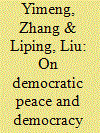| Srl | Item |
| 1 |
ID:
094971


|
|
|
|
|
| Publication |
2010.
|
| Summary/Abstract |
The international system of the Eastern Zhou has long held a fascination for international relations theorists. Like Europe in the 18th and 19th centuries it had a small number of great powers interacting over a single cultural space. Thus it presents another sandbox in which to test theories of international relations using historical data. Pre-Qin China is both a rich source of data for international relations specialists and a rich source of analytical insight. The work of Han Fei, Mo Di or Mencius is at least equal in value to that of Thucydides in the Western canon. The added value of pre-Qin China is that we have an independently authored set of historical texts that lay out the narrative of inter-state relations in ways that allow us to independently evaluate the relationship of data to interpretation and analysis. This allows us to place modern scientific analytic frames around the interpretive propositions of pre-Qin thinkers, and independently evaluate the data in that light. We are also able to reconstruct the interpretive frames of pre-Qin thinkers in ways that correspond more closely to scientific methodology. We must be careful, however, not to identify our reconstructed frames that draw heavily on the received body of scientific discourse, with the original frameworks proposed by pre-Qin thinkers. What we should be looking for is neither how modern practice validates the insights of pre-Qin thinkers, nor how pre-Qin thinkers anticipate modern scientific theory. The latter form of anachronistic theorizing may be satisfying for nationalist ideologists or for parlor-room discussion, but has no place in scientific discourse.
|
|
|
|
|
|
|
|
|
|
|
|
|
|
|
|
| 2 |
ID:
104226


|
|
|
|
|
| Publication |
2011.
|
| Summary/Abstract |
Democratic Peace and Democracy Exporting are two relatively young theories in the Western IR theory family. The authors believe both are questionable assertions. Democracy, whether as personal consciousness or a political mechanism, can only arise when the productivity of a nation reaches a certain level. Fundamentally, even if we agree with the assertion that democracy leads to peace, the real reason is level of productivity; democracy is only a result. Secondly, the close relationship between democracy and capitalism means that democracy can not be exported randomly. To treat democracy as a universally adaptable commodity exportable to any nation without considering the level of productivity can hardly be successful; in fact, it may be harmful to some nations.
|
|
|
|
|
|
|
|
|
|
|
|
|
|
|
|